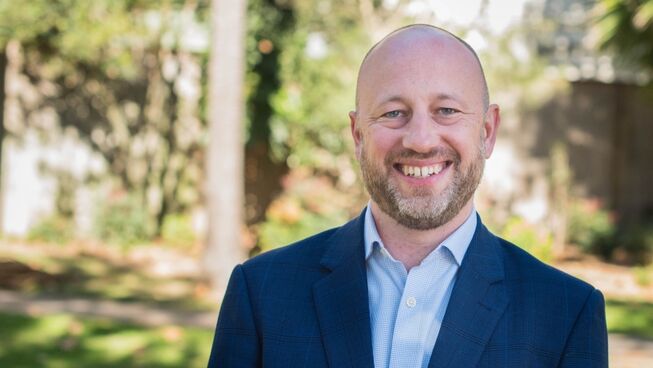When life feels like rojak salad

Last week I was asking a friend how he is finding this COVID-19 season of working from home under lockdown. He replied, “It’s like a rojak salad”. Call me naïve, but I needed further explanation!
“Rojak salad”, he explained, “is a Chinese or Indian dish where deep fried bread, cuttlefish, assorted sliced fruits, peanuts, and some spicy sweet sauce are all mixed together. Life feels like that at the moment for me – everything is mixed together. There are no boundaries between work and home”. He went on to explain that ordinarily his evening commute was a chance to leave the issues of work behind for the day and transition to the night ahead at home with his family. At the moment, with that missing, life felt like the crazy mix of ingredients that make up rojak salad.
I suspect my friend is not the only one feeling this. And in some ways it’s not a new feeling. Over the past decade technology has blurred the lines between work and home. This season of COVID-19 isolation is only exacerbating the problem. So when life feels like rojak salad how do we respond? How does the Bible help us find boundaries? Here are four suggestions:
1. Acknowledge the limits of being human
Firstly, we need to acknowledge that while work is now constantly with us, we cannot constantly work. That is, acknowledge the limits of being human. We need to rest. We need to sleep. We need to down tools, so to speak, because we are finite.
But one of the great truths of Scripture which frees us to do this is that we rest in a God who is infinite. He does not need to rest, nor sleep (Psalm 121: 3-4). He is always at work (John 5:17), upholding the universe by His powerful word (Hebrews 1:3). And as important as your work is (and it does matter to God), He can manage without you for a few hours! Reminding ourselves that we are finite and God is infinite relieves us from the burden of constantly needing to work, and feeling the pressure to do so.
2. Rest in your identity in Christ
Secondly, the burden to always be at work might not be something we place upon ourselves, but feel others placing on us. Particularly when we are working from home we might feel an added burden to make sure our colleagues and our boss know we are labouring hard – sending emails late at night or on the weekend is a classic example of how we might try to subtly communicate this!
But, presuming that before God you can honestly say that you have laboured this day faithfully with the strength and ability that He has given you, then beyond that we don’t ultimately need to prove ourselves to anyone else. When our identity as loved and cherished children by God (Matthew 3:17) is sure in our mind, we also find ourselves freed to step away from our work, not needing to prove ourselves through our work to anyone else.
3. God sets boundaries
Have you noticed how one of God’s first creative acts is to set boundaries? “God saw that the light was good, and He separated the light from the darkness” (Genesis 1:4). “And God said, ‘Let there be a vault between the waters to separate water from water.’ So God made the vault and separated the water under the vault from the water above it” (1:6-7). “And God said, ‘Let the water under the sky be gathered to one place, and let dry ground appear.’ And it was so.” (1:9). Our God is a God of order, who recognises that all things in His creation have their rightful place. When those creation boundaries are blurred chaos ensues (think about the chaos of the ocean breaking its boundaries in a tsunami).
Boundaries are a good, God-ordained, and God-given part of His creation. And if they are good enough for God then they should be good enough for us!
Of course this is not to contradict the important truth that all of life for the Christian person is sacred and to be lived for God's glory (1 Corinthians 10:31). That is, we shouldn't split aspects of life up by some sacred/secular divide. Rather, holding onto that important truth, we still need to place boundaries between the different "goods" in our life, again, just as God does.
4. Make deliberate steps to switch off and step away from work
Reminded of these three truths should give us a great sense of freedom to establish boundaries between work and home, and not feel guilt over them. Indeed, we must seek to set boundaries in place as God does at creation, knowing the chaos that can ensue when we don’t!
For each person this will look different, but let me tell you I’m doing to set boundaries in this season. I have three children at home also doing their school and Kinder learning. Based on our house we’ve decided the best place for me to set up my home office so that I might be least disturbed is in my bedroom. One practice I’m being very deliberate about is at the end of each day making it almost a ritual to close the lid of my laptop and say to myself “that’s it for today”. I’m then also turning my phone off for two hours while it is evening time with the kids before they go to bed. I’ll then walk out of my bedroom and close the door behind me, another little act that reminds me, “that’s it for today”. If I need to, I’m taking a quick five-minute walk around the block, another act designed to communicate to my body and mind that work is done for the day.
Of course, working in my bedroom means that I need to return to that room later in the evening! And the chair that I sit in during the day to work is one I normally like to sit in after work and read. Sometimes I’m doing that, but sometimes I’m finding a different chair in the house to read; again a small act that reminds my mind of the boundaries between work and home.
This is what is working for me to avoid that rojak salad feeling! But it will be different for each person. The key is to remind ourselves of those liberating truths that free us to step away from our work, and then follow God’s example of setting boundaries.
You can read more about the pressure of ever-present work in Andrew Laird’s book Under Pressure.





